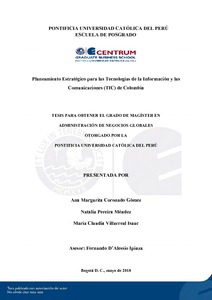| dc.contributor.advisor | D´Alessio Ipinza, Fernando Antonio | |
| dc.contributor.author | Coronado Gómez, Ana Margarita | es_ES |
| dc.contributor.author | Pereira Méndez, Natalia | es_ES |
| dc.contributor.author | Villarreal Isaac, María Claudia | es_ES |
| dc.date.accessioned | 2018-08-09T00:15:30Z | |
| dc.date.available | 2018-08-09T00:15:30Z | |
| dc.date.created | 2018 | |
| dc.date.issued | 2018-08-08 | |
| dc.identifier.uri | http://hdl.handle.net/20.500.12404/12433 | |
| dc.description.abstract | Las Tecnologías de la Información y Comunicaciones (TIC) están transformando las
modalidades de interacción social y las relaciones personales alrededor del mundo, ante lo
cual Colombia no es la excepción. Para los fines del presente documento, TIC se refiere no
solo a Internet y a telefonía, sino al contenido digital, a las aplicaciones, y a otras
herramientas para la producción dentro del ecosistema digital. En los últimos años, en el país
se ha impulsado un proceso de modernización soportado en las TIC, como resultado del Plan
Vive Digital I, formulado dentro del Plan Nacional de Desarrollo (PND) 2010-2014:
Prosperidad Para Todos (Departamento Nacional de Planeación [DNP], 2010) y continuado
dentro del Plan Nacional de Desarrollo 2014-2018: Todos por un Nuevo País (DNP, 2015).
Utilizando este contexto, se ha creado el presente Plan Estratégico, donde se propone que
para 2023, Colombia se ubique en el primer puesto de Latinoamérica según el Índice de
Desarrollo de Ecosistema Digital (IDED), apoyando las transformaciones requeridas para la
construcción de una paz estable y duradera en Colombia. Para conseguir ello, se deberán
implementar las siguientes estrategias, que han sido profundamente analizadas: (a) coordinar
con organismos públicos y privados que fomenten la I+D+i y el desarrollo de nuevas líneas
estratégicas para las industrias del futuro; (b) exportar servicios TIC, para penetrar en EE.
UU. y Europa, así como desarrollar otros mercados en Latinoamérica; (c) incentivar el uso de
las TIC en los sectores productivos a través del desarrollo de soluciones específicas adaptadas
a las necesidades de cada sector; (d) impulsar el comercio electrónico a través del desarrollo
de regulaciones y programas que generen confianza a los usuarios en el uso de medios
digitales; y (e) lobby con el Gobierno para obtener beneficios tributarios por la disminución
de la huella de carbono a través de la incorporación de TIC en los sectores productivos; entre
otras | es_ES |
| dc.description.abstract | Information and Communication Technologies (ICT) are transforming the modalities
of social interaction and personal relationships around the world, to which Colombia is no
exception. In the context of the current document, ICT refers to Internet and phone service,
as well as to digital content, apps, and other production tools within the digital ecosystem. In
recent years, a modernization process supported by ICT has been promoted in the country, as
a result of the Plan Vive Digital I, formulated in the context of the Plan Nacional de
Desarrollo (PND) 2010-2014: Prosperidad Para Todos (Departamento Nacional de
Planeación [DNP], 2010) and continuing with the Plan Nacional de Desarrollo 2014-2018:
Todos por un Nuevo País (DNP, 2015). Using this as context, the present Strategic Plan has
been created, where it is proposed that by the year 2023, Colombia will be ranked first in
Latinoamérica according to the Digital Ecosystem Development Index (IDED), supporting
the transformations required for construction of a stable and lasting peace in Colombia. To
achieve this, the following strategies must be implemented, which have been thoroughly
analyzed: (a) coordinate with public and private organizations that promote R + D + i, the
development of new strategic lines for the industries of the future; (b) export ICT services, to
penetrate the United States and Europe, as well as develop other markets in Latinoamérica;
(c) encourage the use of ICT in the productive sectors through the development of specific
solutions adapted to the needs of each sector; (d) promote electronic commerce through the
development of regulations and programs that generate confidence in the use of digital media
by users; and (e) lobbying the government to obtain tax benefits for the reduction of the
carbon footprint through the incorporation of ICT in the productive sectors; among other | es_ES |
| dc.language.iso | spa | es_ES |
| dc.publisher | Pontificia Universidad Católica del Perú | es_ES |
| dc.rights | info:eu-repo/semantics/openAccess | es_ES |
| dc.rights.uri | http://creativecommons.org/licenses/by-nc-nd/2.5/pe/ | * |
| dc.subject | Tecnología de la información--Colombia | es_ES |
| dc.subject | Planificación estratégica | es_ES |
| dc.title | Planeamiento estratégico para las tecnologías de la información y las comunicaciones (TIC) de Colombia | es_ES |
| dc.type | info:eu-repo/semantics/masterThesis | es_ES |
| thesis.degree.name | Maestro en Administración de Negocios Globales | es_ES |
| thesis.degree.level | Maestría | es_ES |
| thesis.degree.grantor | Pontificia Universidad Católica del Perú. CENTRUM | es_ES |
| thesis.degree.discipline | Administración de Negocios Globales | es_ES |
| renati.discipline | 413307 | es_ES |
| renati.level | https://purl.org/pe-repo/renati/level#maestro | es_ES |
| renati.type | https://purl.org/pe-repo/renati/type#tesis | es_ES |
| dc.publisher.country | PE | es_ES |
| dc.subject.ocde | https://purl.org/pe-repo/ocde/ford#5.02.04 | es_ES |






